BRITBASE - British Chess Game Archive
Tournament: 37th Hastings Premier 1961/62 • Go to: Previous Year • Next Year • updated
December 28, 2024 10:47 AM
Venue: Sun Lounge • Dates: 27 December 1961 - 5 January 1962 • Download PGN (45/45 Premier + 22 games/part-games from lower sections)
1961/62 Hastings Premier, 27 December 1961 - 5 January 1962, Sun Lounge, Hastings Pier
| 1961/62 Hastings Premier |
Residence | 1 | 2 | 3 | 4 | 5 | 6 | 7 | 8 | 9 | 10 | Total | ||
|---|---|---|---|---|---|---|---|---|---|---|---|---|---|---|
| 1 | Mikhail Botvinnik | USSR |
|
½ | ½ | 1 | 1 | 1 | 1 | 1 | 1 | 1 | 8 | |
| 2 | Svetozar Gligoric | Yugoslavia | ½ |
|
1 | 0 | ½ | 0 | 1 | 1 | 1 | 1 | 6 | |
| 3 | Salo Flohr | USSR | ½ | 0 |
|
½ | ½ | ½ | ½ | 1 | 1 | 1 | 5½ | |
| 4 | Arthur B Bisguier | USA | 0 | 1 | ½ |
|
½ | 0 | 1 | ½ | ½ | 1 | 5 | |
| 5 | Jonathan Penrose | London | 0 | ½ | ½ | ½ |
|
½ | 1 | 1 | 0 | 1 | 5 | |
| 6 | John Eric Littlewood | Skegness | 0 | 1 | ½ | 1 | ½ |
|
0 | 0 | 1 | 0 | 4 | |
| 7 | Karl Robatsch | Austria | 0 | 0 | ½ | 0 | 0 | 1 |
|
½ | 1 | 1 | 4 | |
| 8 | Robert Graham Wade | Ilford/NZL | 0 | 0 | 0 | ½ | 0 | 1 | ½ |
|
½ | 1 | 3½ | |
| 9 | Leonard W Barden | London | 0 | 0 | 0 | ½ | 1 | 0 | 0 | ½ |
|
1 | 3 | |
| 10 | Manuel Aaron | India | 0 | 0 | 0 | 0 | 0 | 1 | 0 | 0 | 0 |
|
1 | |
BCM, February 1962, ppn 40-41 by William Ritson Morry (who was tournament controller)
Gligoric did well to recover from the disasters of the early rounds which would have demoralized most players. It must be sad for him to realize that had he won those two lost games, as he undoubtedly should have done, he might have had the honour of a tie with the World Champion, although Botvinnik might well have made a big effort to beat Flohr in the final round and one cannot say how Gligoric might have fared if he had been forced to play for a win against Penrose with the black pieces.
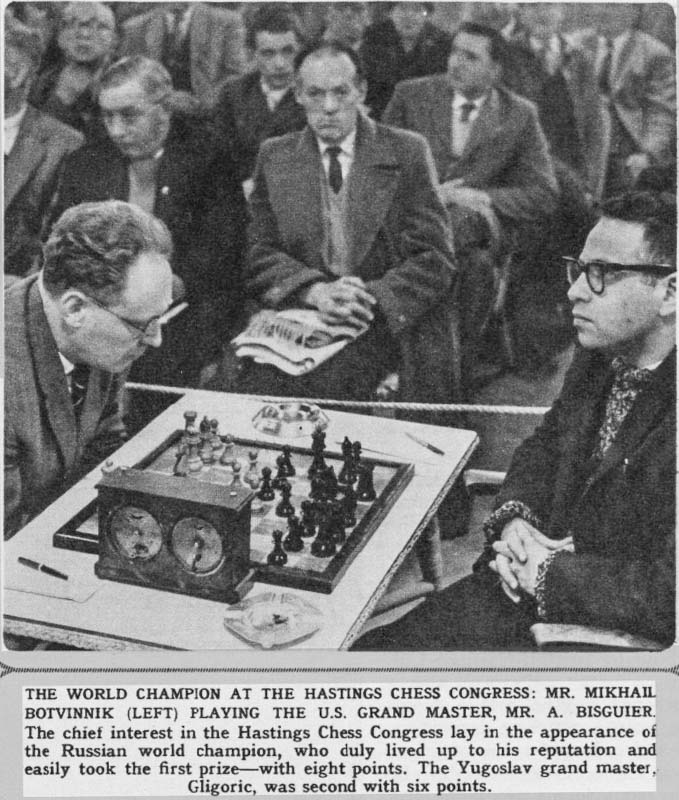
Photo: Illustrated London News, January 1962
Flohr played steadily but is clearly well past the peak of his career when his machinelike technique was feared by the greatest players. Bisguier played some bright attacking games but spoilt his chances with a bad loss to Littlewood. The other grandmaster, Robatsch, was obviously out of form at the start and left himself no chance of reaching the prize list. Aaron clearly has much technical knowledge to assimilate before he can hope to do himself justice in exalted company.
Of the home players Penrose clearly stands out as our finest exponent. He has theoretical knowledge and excellent judgment which makes him capable of beating the very best players. His only failing seems to lie in his extremely modest estimate of himself which does not breed the determined self confidence necessary for sustained victory, but he is still youthful enough to develop this quality and gain the grandmaster title which his multitude of admirers wish for him.
Wade is now reaching the age when he can hardly develop further, but Littlewood and Barden still have youth on their side and both have the ability to improve provided they can overcome certain evident defects. One can, perhaps, best summarize by saying that Barden's encyclopaedic theoretical knowledge and Littlewood’s quick-witted ingenuity and flair for combination united in one person would make a wonderful player.
It was interesting to hear Botvinnik pay tribute to the great advance in the standard of the British players since his previous visit. This was a well deserved pat on the back tor generation of young men who have not only given much attention to acquiring chess skill but have also manifested much greater self discipline than did many of their predecessors. “Mens sana in corpore sano” is a very good maxim for a chess master.
1961/62 Hastings Premier Challengers
| 1961/62 Hastings Premier Challengers |
Draw No. |
Residence | 1 | 2 | 3 | 4 | 5 | 6 | 7 | 8 | 9 | 10 | Total | ||
|---|---|---|---|---|---|---|---|---|---|---|---|---|---|---|---|
| 1 | Manfred Mannke, snr1 | 1 | Poland |
|
½ | 0 | 1 | 1 | ½ | ½ | ½ | 1 | 1 | 6 | |
| 2 | Drazen Marovic | 9 | Yugoslavia | ½ |
|
0 | ½ | ½ | 1 | 1 | 1 | ½ | 1 | 6 | |
| 3 | Dragoljub Velimirovic | 2 | Yugoslavia | 1 | 1 |
|
0 | 1 | ½ | ½ | ½ | 0 | 1 | 5½ | |
| 4 | Bernard Cafferty | 6 | Birmingham | 0 | ½ | 1 |
|
½ | ½ | ½ | 1 | ½ | ½ | 5 | |
| 5 | Adrian S Hollis | 4 | Oxford | 0 | ½ | 0 | ½ |
|
1 | ½ | ½ | 1 | 1 | 5 | |
| 6 | Wlodzimierz Schmidt2 | 3 | Poland | ½ | 0 | ½ | ½ | 0 |
|
1 | ½ | ½ | 1 | 4½ | |
| 7 | Andrew Rowland B Thomas | 10 | Tiverton | ½ | 0 | ½ | ½ | ½ | 0 |
|
1 | 1 | 0 | 4 | |
| 8 | Dr. Werner Alles | 7 | W.Germany | ½ | 0 | ½ | 0 | ½ | ½ | 0 |
|
1 | 0 | 3 | |
| 9 | Peter Campbell Gibbs | 8 | Birmingham | 0 | ½ | 1 | ½ | 0 | ½ | 0 | 0 |
|
½ | 3 | |
| 10 | Hans Ek3 | 5 | Sweden | 0 | 0 | 0 | ½ | 0 | 0 | 1 | 1 | ½ |
|
3 | |
1 Mannke thus qualified for the 1962/63 Hastings Premier but tragically died in a car accident in Poland in August 1962, aged only 26. See Polish Wikipedia.
2 Both BCM and CHESS give "W. Schmidt (W.Germany)" but I'm inclined to think this is the strong Polish player of that name - JS
3 the crosstable published in CHESS/27/401-2, p147, was later corrected (CHESS/27/404, p183) to show that ARB Thomas had lost to Ek and not drawn as previously shown. Modern Berger pairings used.
The Challengers Tournament
From a British viewpoint the Challengers Tournament was somewhat of a disappointment. In Hollis, Gibbs, and Cafferty we had three representatives who were capable of winning the coveted place in next year’s Premier Tournament, but none of them manage even to win a prize.
Some entertaining games were played, but there was no outstanding personality and the comparative smallness of the winners’ scores shows that there was a close contest between players of fairly uniform strength which gives little reason to expect that the winner of any tie-match will do outstandingly well in the higher grade next time.
The General Congress
The entry for the general sections was so numerous that it brought the total playing to 224, easily a record for the Hastings Congress. It was also of high playing strength throughout.
Chief interest in these sections centred on two personalities for widely different reasons. In Premier Reserves "A” the winner was D. Baretic, a near-blind player with great talent. His lively play drew many spectators.
In Premier Reserves “B” the new American Woman Champion, Mrs. Lisa Lane, attracted a barrage of newspaper publicity for herself and the tournament when she withdrew. On her arrival she explained to the Congress Director that she did not wish to play in the mornings and with his usual kindness of heart he agreed to her playing in the afternoons if her opponents agreed. The opponents were also very obliging, but there was bound to be difficulty in finding time for adjourned games and some players faced problems over evening meals. This did not seem to worry the lady at all, nor did it impress her that I had to remain on control duty until nearly midnight after a hard day’s work to get her third round game finished. To my protests she replied that she “Just couldn’t get up at 9 o’clock in the morning.”
I then arranged with all her opponents to play on a 2-6 p.m. and 8-10 p.m. schedule to which she agreed. As a reward for my help she failed to turn up on the next two days and then explained to her “press conference” that she was withdrawing because she was in love. By this time she had lost two games and drawn one and had been defaulted in three more, which contrasts strangely with the press story that she had played only one game (the draw). Perhaps it was hardly surprising that the competitors and officials hardly shared the tender thrills which, no doubt, the great British public experienced over this touching one-sided romance.
The rest of the programme ran smoothly to schedule, so unromantic are the majority of chess enthusiasts!
1961/62 Hastings Premier Reserves A
| 1961/62 Hastings Premier Reserves A |
Residence | 1 | 2 | 3 | 4 | 5 | 6 | 7 | 8 | 9 | 10 | Total | ||
|---|---|---|---|---|---|---|---|---|---|---|---|---|---|---|
| 1 | Dragoljub Baretic | Yugoslavia |
|
1 | 1 | 1 | ½ | 1 | 1 | ½ | 1 | 1 | 8 | |
| 2 | Werner Nicolai | W.Germany | 0 |
|
½ | ½ | 1 | 1 | ½ | 1 | ½ | 1 | 6 | |
| 3 | David E Lloyd | London | 0 | ½ |
|
½ | 1 | ½ | 1 | ½ | 0 | 1 | 5 | |
| 4 | Henk J van Donk | Netherlands | 0 | ½ | ½ |
|
½ | ½ | ½ | ½ | 1 | 1 | 5 | |
| 5 | Dr. Reinhard Cherubim | W.Germany | ½ | 0 | 0 | ½ |
|
½ | ½ | 1 | 1 | ½ | 4½ | |
| 6 | Ronald A Fuller | Ilford | 0 | 0 | ½ | ½ | ½ |
|
½ | ½ | 1 | 1 | 4½ | |
| 7 | David J Mabbs | Harrow | 0 | ½ | 0 | ½ | ½ | ½ |
|
½ | 1 | 1 | 4½ | |
| 8 | James Joseph Walsh | Ireland | ½ | 0 | ½ | ½ | 0 | ½ | ½ |
|
1 | ½ | 4 | |
| 9 | Heinrich Jühe | W.Germany | 0 | ½ | 1 | 0 | 0 | 0 | 0 | 0 |
|
1 | 2½ | |
| 10 | Marcel Barzin | Belgium | 0 | 0 | 0 | 0 | ½ | 0 | 0 | ½ | 0 |
|
1 | |
(notes for future reference: Baretic played Cherubim in rd 1, Mabbs in rd 8 & Walsh in rd 9)
Premier Reserves B: (1) David Graham Wells (Bristol) 7/8; (2) Pank A Hoogendoorn (Dordrecht) 6; (3) Bozidar Gasic (Yugoslavia) 5; (4) H J Bredewout (Zwolle) 4; (5-6) W Gergs (W.Germany), Eileen Betsy Tranmer (London) 3½; (7) Percy B Cook (London) 3; (8) Harry Gethin Thorp Matchett (Bexhill) 2½; (9) Arthur Hall (Hastings) 1½.
There was a tenth player, Lisa Lane (USA), who withdrew after playing a handful of games and defaulting others but neither BCM nor CHESS recorded her score in their results list. She drew with Eileen Tranmer, lost three games, defaulted three others and withdrew. But for the UK tabloids she was the only story in town - see below.
Premier Reserves C: (1) Peter W Hempson (London) 7/9; (2) M Klein (West Germany) 6½; (3) Lawrence Alfred J Glyde (Ilford) 5; (4-5) Otto H Hardy (Coalville), Gerardus Cornelis (Ger) van Perlo (Netherlands) 4½; (6-7) Richard C Moran (USA), James R Nicolson (Manchester) 4; (8) A Philip Primett (Haywards Heath) 3½; (9-10) (James) Stuart Ridgway (Wilmslow), H Friberg (Sweden) 3.
Premier Reserves D: (1-2) Rudolf Bedenbender (W. Germany), Tomislav Pervan (Yugoslavia) 6½/9; (3-4) Paul R Bielby (Huddersfield), Keith Bevan Richardson (Nottingham) 5½; (5) David W Anderton (Wolverhampton) 5; (6) John A Henley (St. Albans) 4; (7) Alan Edgar Nield (St. Leonards) 3½; (8-9) Andrew J Whiteley (Oxford), Alfred Dempster Whyte H (St. Leonards) 3; (10) David Bruce Pennycuick (Liverpool) 2½.
Premier Reserves E: (1) Harold Keiter (West Germany) 6½/9; (2-3) Victor Wilfred Knox (Moreton), David A Smith (Stockton) 6; (4-5) (Denis) Michael Denison, John Kenneth Footner 5 (Oxford); (6-7) J Gordon Lloyd, John Anthony Sutton (Stafford) 4; (8) James E Scholes (Sheffield) 3½; (9) Philip Bernard Sarson (Bracknell) 3; (10) M Jackson 2.
Premier Reserves F: (1) Andrew Frank Footner (Oxford) 6½; (2) Percival Arthur Cooke (East Grinstead) 6; (3-4) (Frederick) Michael Akeroyd (Cambridge University), Alfred Milner (Didsbury) 5½... is the CHESS Magazine version of the scores (with only four names supplied). However, BCM's version is markedly different... (1) Andrew Frank Footner 6½/9; (2-4) (Frederick) Michael Akeroyd, W A Davidson, Alfred Milner (Didsbury) 5½; (5) Percival Arthur Cooke 5; (6) Roger L Baker 4½; (7) Leopold Franz Lindheimer 4; (8) G F Pelling 3½; (9) Harold Horace Watts (Southport) 3; (10) Arthur T Watson 2.
Premier Reserves G: (1-3) Michael P Cook (Suffolk), Geoffrey Alan Hollis (St. Leonards), Peter R Kings (Warminster) 6½/9; (4) Roger L Paige 5; (5) William L Brierley (Beckenham) 4; (6-9) Anthony James Booth, Thomas Eagle Lovell Chataway (Stourbridge), Michael J Freeman, Dr. Francis Henry Charles Marriott (Nuneham Courtenay) 3½; (10) William Bainbridge 2½.
Premier Reserves H: (1) Anthony J Gillam (Derby) 6½/9; (2-3) John A Felton (St. Leonards), E J Smith (Chatham) 6; (4) David Neil L Levy (London) 5½; (5-7) E Fairbrother (Ashford), James Heneage McKenzie Finch (Canterbury), Richard St George Upton (Oxford) 4½; (8) Ernest George Exell (St. Albans) 3; (9) A E Harris (Hastings) 2½; (10) Gregory Owen J Melitus (London) 2.
Premier Reserves I: (1) Christopher W Johns (Sandy) 8/9; (2) J N Kemp (Rochester) 6; (3-4) Bernard T Crouter (Weston-super-Mare), P Smith (Hastings) 5½; (5-7) R A Hubbard, Edmond Julien T Leyns (Bishops Stortford), W Ross (Studley) 4½; (8) William Edward Busbridge 2½; (9-10) Geoffrey George Homan (Rochester), V Horn (Taunton) 2.
Premier Reserves Afternoon A: (1) P Henriksen (Denmark) 8½/9; (2) G G Boon (Netherlands) 7½; (3) P M Hodkinson (Norfolk) 6; (4) Herbert Francis Gook 5½; (5) Willington Lucette Wakefield 5; (6-8) Rev. Henry Middleton Blackett, Jack Horrocks, K Joachim 3; (9) Richard Charles Winter 2½; (10) A Susterhenn 1.
Premier Reserves Afternoon B: (1-2) John Myles Gorton (St. Leonards), C l Rusenescu (London) 7/9; (3-4) John Gibson (Horncastle, SCO), Ronald Ernest Rushbrook (London) 6; (5) George A Peck (Rugby) 5; (6) H Taylor 4½; (7) Patric Kirtlan 4; (8-9) T W Baxter (London), Philip Stuart Kitcher (Eastbourne) 2; (10) J Hatherley 1½.
Open A: (1) A Buckle (Hastings) 7/9; (2-4) R J Duckett (Sanderstead), D Ellis (Leeds), C Waring (Manchester) 6½; (5) A K Henderson, Brian A M Piggott 5; (6) S C Zaiker 4; (7-8) Harold Edward Druce, Lewis James Worsell 2; Miss J Passmore ½.
Open B: (1) R A Oxenham (Hastings) 7/8; (2) C Bryan (Hastings) 6; (3) Miss Olive Richards (South Africa) 5½; (4-5) E Chambers, J D Rew 4; (6) H Cohen 3½; (7-9) Mrs. W van den Bergh, J H Brown, E Peck 2.
Open C: (1) Miss E Shirley Mann (Warnham) 8/9; (2) Terence Ian Maylam (Hastings) 7; (3-4) Mrs Jean Regina Amelia Nicole (née Barnett) (Guernsey), Mrs E Lewis (Hastings) 6; (5) A Penwill 5; (6) Mrs Laura Ethel Amelia Start 4½; (7) Lady Gwendolyn Harriet Herbert 4; (8) Miss M Kennedy 3½; (9) C H Sinkovic 1; (10) B Gould 0.
Open Afternoon: (1) John T Hearson (Mapperley) 8½/9; (2) L L M Jones (Guernsey) 7½; (3) H Marner (Brighton) 7; (4-5) C V Lucas (St Leonards), F C Shorter 5½; (6) G Burnett (Worcester) 4; (7) A H Harris 3; (8-9) Dr. Frederick Bromley Akeroyd (Whitby), Miss E Whyte 2; (10) Miss Elsie Grace Coulson 0.
Christmas Special A: (1-2) Malcolm Firth (Chadderton), John Dudley Taylor (Sheffield) 4½/5; (3) (Sydney) Hugh Brocklesby (Bath) 2½; (4) David George Springgay 2; (5) Alex Montwill (Dublin) 1½; (6) William Wyndham Tatum 0.
Christmas Special B: (1) Richard J Braunton (London) 4½/5; (2-3) Miss Annie Hilda Gammans (Shoreham), M J McCabe (London) 3; (4-5) Dr. D D Ryder-Smith, R Sheppard 2; (6) H B Howard ½.
Christmas Special C: (1) Colin Irvine Moffat (Kingston) 4½/5; (2-3) Leslie Valentine Robert Elgy (London), W G Walton (London) 3; (4) A E Oram 2; (5) Robert Littler (Chester) 1½; (6) R de Normanville 1.
Christmas Special Afternoon: (1) Graham Kenneth Sandiford (Cambridge University) 4/5; (2) Christopher Robin Nicole (Guernsey) 3; (3) J A Bloxson (Gosport) 2½; (4-5) Frederick William Boff, Norman Charles Pyper 2; (6) E C Baker 1½.
New Year Special A: (1-2) Lewis Johnstone Mills (Clacton), Christopher Robin Nicole (Guernsey) 4/5; (3) C C Williams (Lincoln) 3; (4) J W Atkinson 2; (5) J Johnson (Liverpool) 1½; (6) Jack A Speigel ½.
New Year Special B: (1) Eric Wilfred Knapp (London) 4/5; (2) Paul F Habershon (Bath) 3½; (3) G F Johnson (Lincoln) 3; (4) H W Kennett 2½; (5) T Carruthers 2; (6) P Kemp 0.
New Year Special C: (1) A E Coates (Farnham) 4/5; (2) Bernard G Henstock (London) 3½; (3) B Jones (South Croydon) 3; (4) V N Rains 2½; (5) T Woodman 1½; (6) M J Kennett ½.
New Year Special Afternoon A: (1) Robert Weisz1 (London) 4½/5; (2) Richard E Boxall (London) 3½; (3) F Geiger (Bexhill) 3; (4) G Maskell 2; (5) E C Baker 1½; (6) A Tonks ½.
1 The SCCU Bulletin (Jan/Feb 1962, No.24) reported that Robert Weisz died aged 52 on 17 January 1962 less than two weeks after winning this section at Hastings. He collapsed with a heart attack during a league game for Wimbledon vs Guildford and died shortly afterwards.
New Year Special Afternoon B: (1) George Frederick Ramsay (Hastings) 4½/5; (2-3) A G Frisk (Staines), Norman Charles Pyper (Hastings) 3½; (4) T E Smith 2; (5) C T Chevalier 1½; (6) N Goldmans 0.
A Memorable Hastings
CHESS, Vol.27, no.401-2, January 1962, ppn 119-120
The presence of Mikhail Botvinnik, World Champion, made this year’s Hastings Congress memorable. His last appearance at Hastings, 27 years ago, had been a fiasco. Sir George Thomas beat both him and Capablanca to finish, in spite of a last-round loss to R.P. Michell, equal first with Euwe and Flohr. Capablanca came fourth; Botvinnik and Lilienthal equal fifth. Thus Botvinnik finished outside the prize list and took home thirty shillings [£1.50], earned by scoring wins against Miss Vera Menchik, P.S. Milner-Barry and G.M. Norman!
He came back to win the 1936 tournament at Nottingham. Clearly, however, the wish to wipe out that awful 1934-5 memory of Hastings played a big part in persuading him to make one of his very rare trips abroad.
Wipe it out he did! He took the lead from the first and was certain of first place alone, with a round to go. Gligoric played wretchedly against Littlewood and Bisguier but, aided by luck against Botvinnik who toiled through five sessions to create a win then missed it, and against Flohr who got into worse and worse time trouble in an even position, climbed to second place in the end. Flohr speaks for himself among our games. Littlewood advanced his reputation as a daringly imaginative, yet calm, combinative player—and uneven; he captured spectators’ attention so consistently that Jonathan Penrose was hardly noticed playing, perhaps a little below his best but finished with the better score.
Karl Robatsch started with toothache—and three losses—and complained that his own special opening had apparently been more intensively studied in England than any other aspect of chess.
Manuel Aaron, fresh from retaining the championship of India (at Hyderabad, December 3rd-17th), allowed himself to become dispirited.
Alekhine and Tartakover won three times at Hastings but only Flohr had accomplished the feat three times in succession (in 1931-2-3-4) besides tying first the year after that. Gligoric won last Christmas and the year before but failed to complete the hat-trick.
W.Ritson Morry demonstrated amiably throughout, as well as controlling. Only seven turned up for his “simul.”
Dr. Bronowski, opening the congress, disclosed that he had played chess all his life “with pleasure and passion” and considered himself fortunate to have lived through the most tremendous half century in the development of the game. It was just fifty years since the public had suddenly become excited about chess: it began with the great San Sebastian tournament of 1911, when Capablanca first sprung into fame.
At the age of fourteen, Dr. Bronowski learned chess and was taken by his father to a simultaneous exhibition by the then boy prodigy Reshevsky. When he entered the room, he was taken for Reshevsky and got a round of undeserved applause. In 1945, he had played for the Civil Service against a scratch team and found himself faced by a young boy in knickerbockers who had signed his score-sheet “Jonathan Penrose”.
Of the Premier players, eight were non-smokers, only Robatsch and Bisguier indulging.
Raaphy Persitz of Israel, happening to be in Switzerland, popped over for a couple of days.
New Year’s eve had been expected to bring the biggest crowd ever seen at the congress. As a result of the worst road conditions for 60 years, however, the hall was half-empty. Two coaches of London busmen turned back at Bromley—and came again the Saturday after, arriving two hours after the prizegiving had finished! Five members of the Wood family got through, however, taking twelve hours on the 180 miles from Sutton Coldfield and passing one single smash-up involving forty cars.
The U.S. Woman Champion Lisa Lane (no longer married, we now learn; quickly divorced) drew with Eileen Tranmer, lost three games then withdrew. She told the press she had not been able to concentrate because she was in love. This story earned screaming headlines in the press of Britain, Europe and America.
Interviewed after the tournament, Botvinnik tackled a barrage of questions in thoughtful if sometimes rather diplomatic style.
What changes would you wish to see in the present system of qualification for (a) the world championship, (b) the titles of master and grand master?
I think the present system could be operated more efficiently; it is unreasonable for the Interzonal and the Candidates’ Tournaments to be held within the space of four or five months. The number of players in the Candidates’ Tournament is too high. The principle of a return match for the championship itself must be maintained.
Which of the younger players of today do you consider most likely to succeed you as world champion?
The qualifying tournaments will provide the answer.
To what causes do you ascribe the extraordinary reversal of scores in your two matches with Mikhail Tal?
The results simply show that he who plays better wins.
(Editorial comment—There is more in this than meets the eye. We endlessly seek excuses for losses—we should spend our time better ensuring simply that we improve our play!—Ed.)
What do you consider the factors in your own character which have provided the main contribution to your success?
It is impossible to attain great successes without the will to win.
What do you consider the main strengths and weaknesses of the British and American players you have met? What advice could you offer them?
In my opinion the British masters lack all-round playing strength; R. Fischer has no longer any need of my advice.
In how many years do you think chess by electronic computers will become a serious factor in the game?
I believe the time when an electronic machine will begin to play chess is not far off.
There has long been speculation how much your work as an electrical engineer is a distraction from your chess. What proportion of your time do you give to each?
Perhaps my work as an engineer both hinders and helps me as a chessplayer. I have always combined the two and not without success. When I am working as an engineer I confine myself, as far as chess is concerned, to collecting information.
Did you enjoy your visit to England and how soon may we have the pleasure of seeing you here again?
For me, England has brought back many memories from my youth. I haven’t been to these islands for a quarter of a century and a sad number of old friendships have been lost.
Would you be willing to play in a tournament run on the Swiss system and what is your opinion of this system?
I do not like the Swiss system but sometimes it is necessary.
ECHOES OF HASTINGS (CHESS/27/404, February 1962, p183)
In a witty final speech, Botvinnik apologised for the boredom he had inflicted on the stewards and spectators by his protracted 104-move struggle with Gligoric: “I trust I made amends with my twelve move draw with Flohr on the last day.”
Littlewood, with his score of 4 achieved the “norm” which he has only to repeat, in a tournament of similar strength, to become an international master. Barden would have done the same had he won his last round game with Robatsch: nerves must have played a part in his defeat as he had an overwhelming position at one stage.
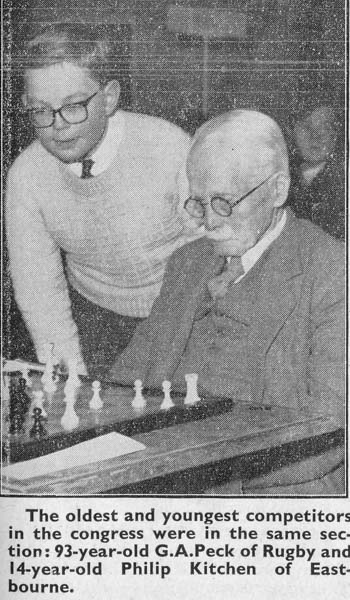
The oldest and youngest competitors in the congress were in the same section: 93-year-old G.A. Peck of Rugby and 14-year-old Philip Kitcher of Eastbourne.
Photo: CHESS/27/404, February 1962, p183
George Arthur Peck (1 July 1868 – 9 January 1966): BCM, February 1966, p69, obituarised him, thus: "Gregory [sic] A. Peck was taken ill on his return home from Hastings where he had competed in the Main Afternoon “B” section, and died on January 9th in his ninety-seventh year. He had played chess for many years and belonged, at various times, to the Durham, Saltburn-by-the-Sea, Nottingham Mechanics, and Kingston-upon-Thames clubs. At the time of his death he was match captain and held the Championship trophy of the Rugby C.C." - mixing him up with a film star of a similar name!
Philip Stuart Kitcher (born 20 February 1947) - note spelling of his surname - is an Emeritus Professor of Philiosophy at Columbia University.
The Lisa Lane Furore...
The UK tabloids became excited when the US women's champion Lisa Lane dropped out of the tournament (Premier Reserves B), allegedly citing lovesickness for a man back home (whom she subsequently married). Even the renowned British 'agony aunt' Marjorie Proops got in on the act. Here's just a fraction of the coverage...
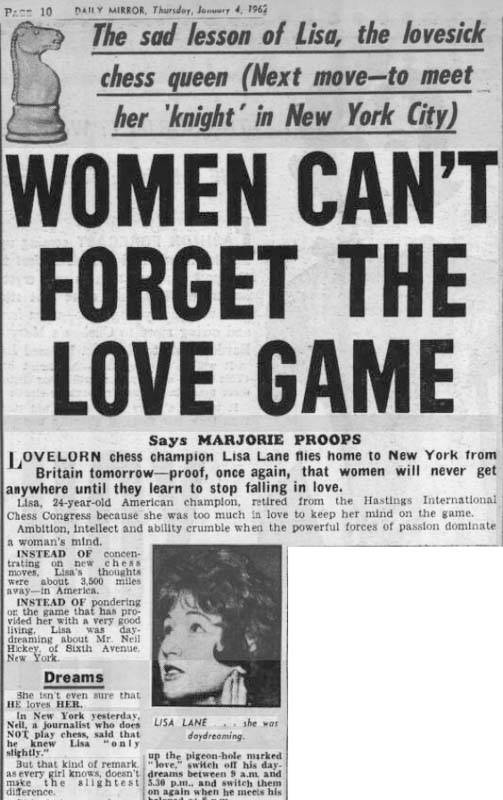
Daily Mirror, 4 January 1962
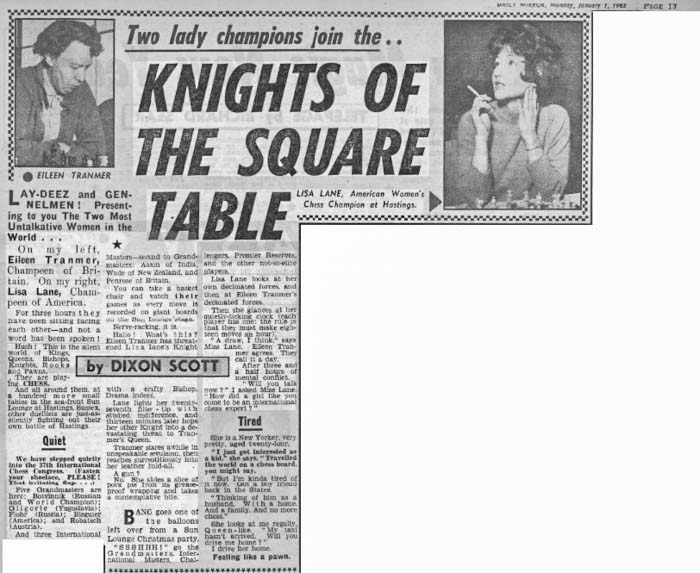
Daily Mirror, 1 January 1962
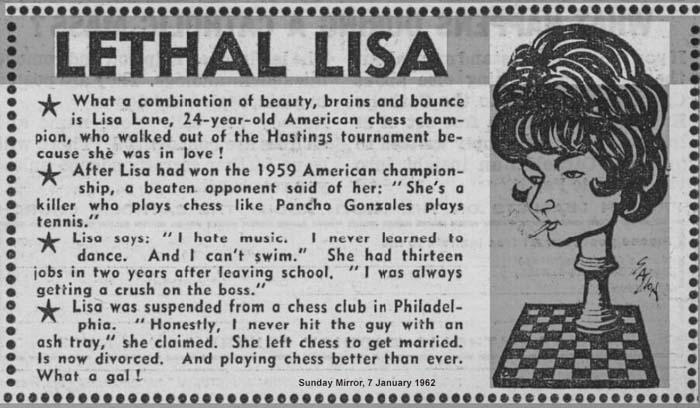
Sunday Mirror, 7 January 1962
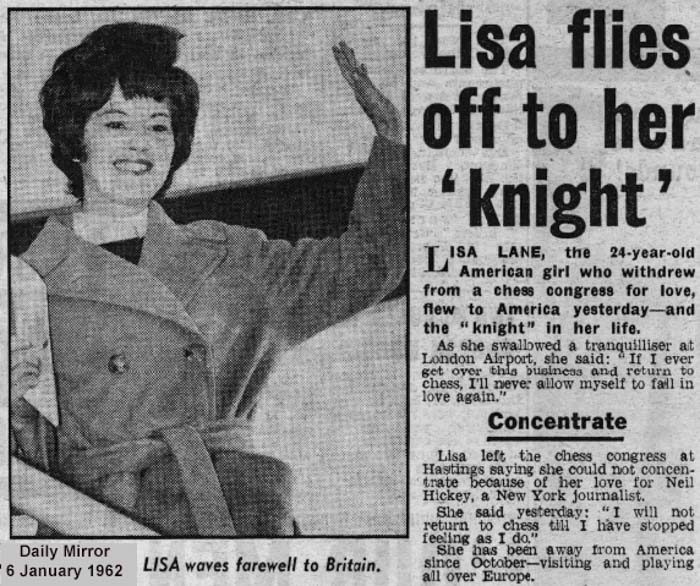
Daily Mirror, 6 January 1962
File Updated
| Date | Notes |
|---|---|
| (some years ago) | 45 out of 45 Premier games previously uploaded as part of a collection of Hastings games |
| 21 January 2023 | 45 Premier games, now with dates, some with extensive annotations; crosstables, results, 12 games from lower sections. Also, some news cuttings of the (in)famous Lisa Lane furore. |
| 22 January 2023 | Andy Ansel has alerted me to differing scores for some of the Hastings Premier games. As a result I have made corrections to the following scores: (1) Littlewood-Barden (rd 4); (2) Botvinnik-Wade (rd 1); (3) Gligoric-Robatsch (rd 2); (4) Aaron-Gligoric (rd 5). Many thanks to Andy. |
| 22 January 2023 | Two further games added: (1) K.B.Richardson 1-0 A.D.Whyte (Premier Reserves D); (2) R.C.Winter 1-0 A.Susterhenn (Premier Reserves Afternoon A). Many thanks to Brian Denman. |
| 22 January 2023 | Added six more games contributed by Ulrich Tamm: (1) A.R.B.Thomas 0-1 D.Marovic (Challengers, rd 8); (2) D.Baretic ½-½ J.Walsh (Reserves A, rd 9); (3) D.Baretic 1-0 W.Nicolat (Reserves A); (4) J.Walsh ½-½ H.van Donk (Reserves A); (5) R.Bedenbender 1-0 P.Bielby (Reserves D); (6) T.Pervan 0-1 R.Bedenbender (Reserves D). Many thanks to Ulrich. |
| 25 August 2024 | Added 1 game and 1 part-game from the Challengers: (1) D.Velimirovic 1-0 D.Marovic (rd 1); (2) D.Velimirovic 1-0 H.Ek (rd 6, part-game - now a complete score, see next entry). These are from Forgotten Genius: the Life and Games of Dragoljub Velimirovic, by George Mohr & Ana Velimirovic-Zorica, Vol.1 (Thinkers Publishing, 2024). Contributed by Gerald Hartmann, 15 August 2024, for which many thanks. |
| 9 September 2024 | The part-game D.Velimirovic 1-0 H.Ek (rd 6, Challengers) is now a complete score, thanks to Ulrich Tamm. |
